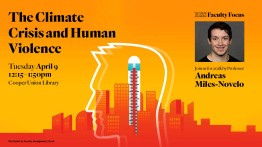The Climate Crisis and Human Violence
Tuesday, April 9, 2024, 12:15 - 1:50pm

Recently, social scientists have begun to look at the human-level impacts of the climate crisis. A key area of research that has emerged from this has looked at how rapid global warming and climate destabilization will impact the risk factors known to cause aggression and violent conflict. As part of a series of talks by HSS faculty, Andreas Miles-Novelo, adjunct assistant professor, looks at the intersecting research across disciplines, discussing the connection between environment, human behavior, and social systems and how the climate crisis increases the risk factors known to create violence and aggression. Such risk factors include resource scarcity, political instability, economic inequity, and higher perceptions of hostility towards "other" groups. These predicted increases are caused by both sporadic climate shocks that agitate current dynamics, as well as long-term developmental impacts resulting from deteriorating material conditions and increased resource scarcity. Discussion about centering possible solutions on available empirical and historical data will follow.
The talk will be held in The Center for Writing and Learning in the library.
Located at 7 East 7th Street, between Third and Fourth Avenues




